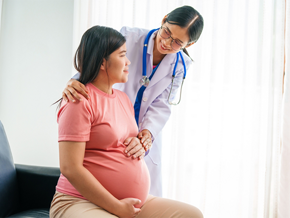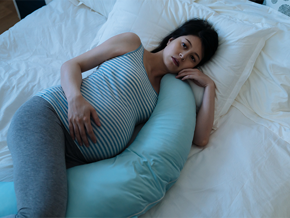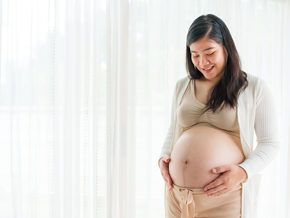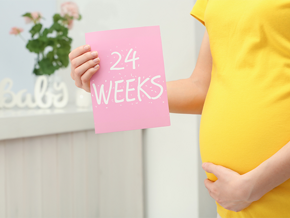
After nine months of focusing on your pregnancy, it's natural to pour your energy into your newborn now. In fact, a 2023 study in BMC Pregnancy and Childbirth found that many moms do this so completely that they think postpartum care is about the baby, overlooking their own needs.
However, your recovery is just as important! With the help of ob-gyn Dr. Jolly Belle Yap (@docjollyobgyne on TikTok and Instagram), we've put together tips that support your body, help manage your emotional well-being, and get the nourishment you need.
1. Prioritize Rest
A good care plan for a postpartum mother includes sleep to heal and get stronger. So, sleep whenever your baby sleeps, even during the day. Let the household chores wait. Ask your partner or family to handle the cooking and laundry so you can focus on your recovery.
2. Focus on Postpartum Body Care
Managing pain is a crucial part of your recovery. As Dr. Yap advises, “whether you delivered via vaginal birth or C-section, never ever forget to take your pain medications as prescribed.”
If you had a vaginal birth, you could soothe soreness by using a squirt bottle filled with warm water after using the toilet. Take daily sitz baths (soaking in shallow, warm water) to help ease discomfort. Wear heavy-duty maternity pads and change them often to monitor bleeding.
If you had a C-section, your recovery will take longer. Keep your incision clean and dry, and follow your doctor's care instructions carefully. Wear loose, soft clothing that won't rub against the wound, and watch for any signs of infection, such as new redness, swelling, or discharge.
3. Eat Nutritious and Healing Foods

A solid postpartum care plan includes a diet rich in protein, healthy fats, and iron for energy and tissue repair.
Eat nutrient-rich foods for proper postpartum care. Get more protein, iron, and fiber by including lean meats, eggs, leafy greens like malunggay, and whole grains. Don’t forget to drink plenty of water throughout the day to stay hydrated.
Bring these lists of energy-giving and milk-boosting foods the next time you go to the palengke.
4. Manage Breastfeeding and Breast Comfort
According to the World Health Organization (WHO), while mothers see breastfeeding as a great way to bond with their baby, it can also be challenging.
To manage common issues like breast engorgement, breastfeed your baby often as part of your postpartum care plan. You can soothe discomfort by using warm compresses before nursing to help with milk flow and cold packs between feedings.
Consider consulting a lactation expert to learn how to stimulate lactation and to help find the right breastfeeding position for you.
To know if your baby is getting enough milk, the American Academy of Pediatrics (AAP) recommends monitoring their weight gain and counting their wet and dirty diapers daily.
5. Monitor Your Emotional and Mental Health

Openly discussing your feelings with your partner or a friend is an important step in caring for your mental well-being.
You might have mood swings for a week or two, also known as the "baby blues," but if deep sadness or anxiety lasts longer, it may be postpartum depression (PPD).
If you’re struggling with PPD, know that you’re not alone. The WHO reports that nearly one in five mothers in developing countries experience depression after birth. PPD is treatable, and getting help benefits both you and your baby. Talk to your partner, friend, or doctor about how you're feeling.
6. Attend All Your Postpartum Appointments
The medical care plan for a postpartum mother should be an ongoing process, rather than a single appointment. The American College of Obstetricians and Gynecologists (ACOG) recommends contacting your doctor for an initial check-up within three weeks of giving birth.
Then, follow it up with a comprehensive visit no later than 12 weeks after childbirth. Use this time to talk about everything, including any physical discomforts, your emotional state, and how you’re sleeping. It's also the perfect opportunity to ask about birth control or family planning.
7. Try to Move (Gently) as Much as You Can
You may feel like you don't have the energy to exercise after giving birth. But any type of physical activity can be helpful, especially when you're feeling out-of-sorts with your body.
A 2023 study in the International Journal of Qualitative Studies on Health and Well-being found that new moms during an eight-week group exercise program reported feeling more capable and confident in their bodies. The women met twice a week for 45-minute sessions of light cardio, strength, and core exercises.
The great news is that once your doctor gives you the okay, you can start with short walks and light stretches to improve your physical and mental health. You can also do pelvic floor exercises like Kegels to support bladder control and core recovery.
FAQs About Postpartum Care
How long does postpartum recovery take?
The initial healing period lasts six to eight weeks (for both vaginal and C-section deliveries), during which your delivery wounds begin to heal and your uterus starts to shrink.
However, full recovery, which includes regaining your strength and feeling like yourself again physically and emotionally, can take six months to a year, according to the American Academy of Family Physicians. So, be patient with yourself.
What is typical postpartum bleeding?
You can expect to bleed for two to six weeks after birth. It will be heavy and red at first, gradually becoming lighter in flow and color.
When is it okay to have sex again?
The general guideline is to wait at least four to six weeks after giving birth, regardless of delivery method, to give your body time to heal.
However, there's no perfect timeline. The most important thing is that you feel physically and emotionally ready. Talk to your doctor first to get their approval and to ask about contraception if you’re not ready for another pregnancy.
What postpartum warning signs should I call my doctor about?
Call your doctor immediately if you experience any of the following:
- A fever over 38°C (100.4°F)
- Bleeding that soaks more than one pad per hour
- Foul-smelling vaginal discharge
- A severe headache
- Vision changes
- Signs of a blood clot like a painful, swollen, red area on your leg
Prioritizing your postpartum care is as important as caring for your newborn. With rest, nourishment, and support, you’ll recover more fully. As Dr. Jolly notes, the “postpartum period can be overwhelming, exhausting, and frustrating to many. Bbut remember you are taking care of a tiny human who will soon call you 'Mommy’.”
Connect with other parents on the ParentTeam Moms and Dads Facebook group and share your own experiences with postpartum care!
References
American College of Obstetricians and Gynecologists (ACOG). "Physical Activity and Exercise During Pregnancy and the Postpartum Period." Committee Opinion No. 804. Obstetrics & Gynecology 135, no. 4 (2020): e178–88. Accessed August 5, 2025. https://www.acog.org/clinical/clinical-guidance/committee-opinion/articles/2020/04/physical-activity-and-exercise-during-pregnancy-and-the-postpartum-period
Brites-Lagos, C., L. Ramos, A. Szumilewicz, and R. Santos-Rocha. "Feasibility of a Supervised Postpartum Exercise Program and Effects on Maternal Health and Fitness Parameters-Pilot Study." Healthcare (Basel) 11, no. 20 (2023): 2801. https://doi.orgorg/10.3390/healthcare11202801
Cleveland Clinic. "Postpartum." Last reviewed February 27, 2024. Accessed August 5, 2025. https://my.clevelandclinic.org/health/articles/postpartum
Lopez-Gonzalez, Dyanne M., and Amandeep K. Kopparapu. "Postpartum Care of the New Mother." Last updated December 11, 2022. In StatPearls. Treasure Island, FL: StatPearls Publishing, 2025. https://www.ncbi.nlm.nih.gov/books/NBK565875/
Mayo Clinic. "Postpartum Care: What to Expect After a Vaginal Birth." December 27, 2023. Accessed August 5, 2025. https://www.mayoclinic.org/healthy-lifestyle/labor-and-delivery/in-depth/postpartum-care/art-20047233
McCauley, H., K. Lowe, N. Furtado, et al. "Essential Components of Postnatal Care – A Systematic Literature Review and Development of Signal Functions to Guide Monitoring and Evaluation." BMC Pregnancy and Childbirth 22, no. 448 (2022). https://doi.org/10.1186/s12884-022-04752-6
Woodley, S. J., P. Lawrenson, R. Boyle, J. D. Cody, S. Mørkved, A. Kernohan, and E. J. C. Hay-Smith. "Pelvic Floor Muscle Training for Preventing and Treating Urinary and Faecal Incontinence in Antenatal and Postnatal Women." Cochrane Database of Systematic Reviews, no. 5 (2020): CD007471. https://doi.org/10.1002/14651858.CD007471.pub4




























